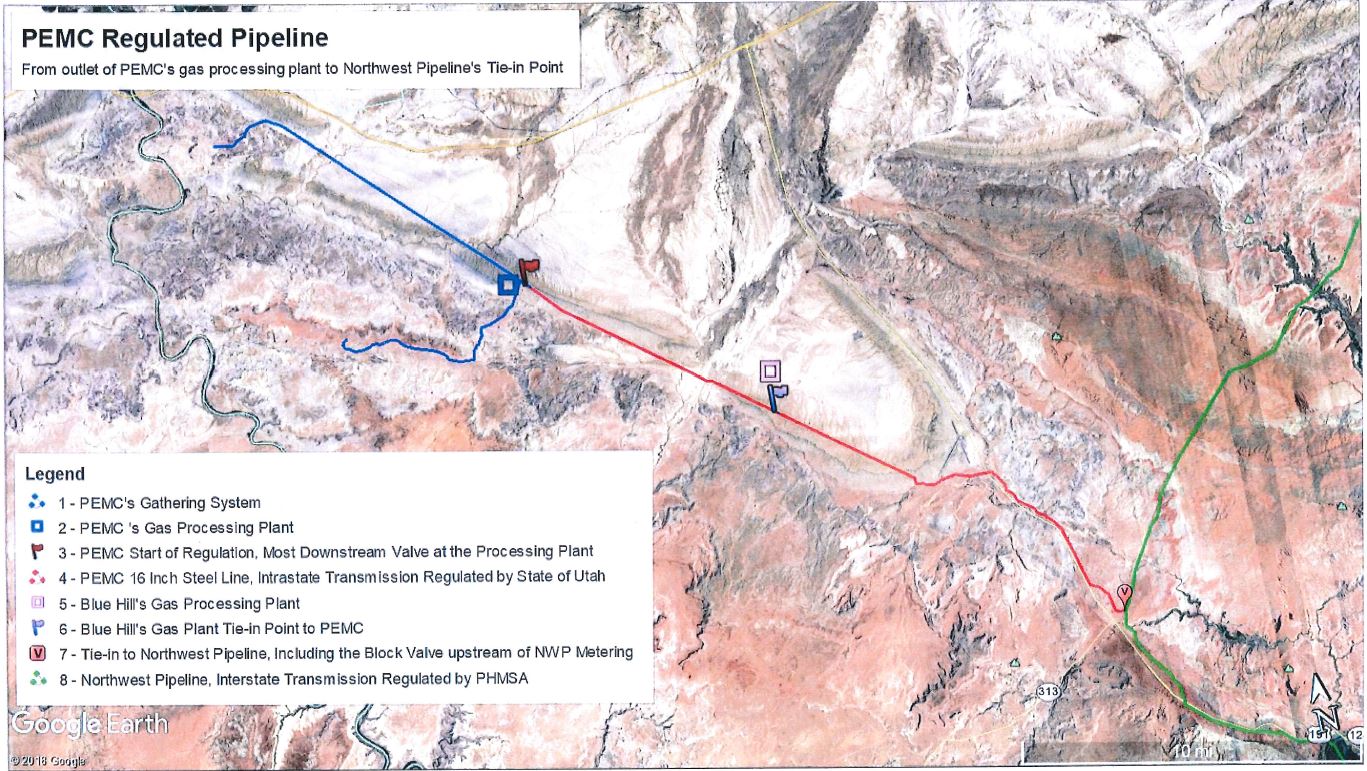Some information may be outdated.
The clock is ticking on a Moab natural gas pipeline operator told it has 60 days to come into compliance or it must turn off its valves and shut down operations due to ongoing safety and regulatory violations.
Reno-based Pacific Energy & Mining Company (PEMC) operates a 21-mile steel pipeline that connects a natural gas processing facility near Canyonlands Field Airport to the interstate Northwest Pipeline outside of Moab near state Route 313 and U.S. Highway 191.
The Utah Division of Public Utilities said on April 12 that following its investigation that began in 2016, the Utah Public Service Commission ordered PEMC on April 10 to cease operating within 60 days, notify affected entities and pay a $100,000 civil penalty to the state.
PEMC could not be reached for comment by press time.
Chris Parker, director of the Utah Division of Public Utilities, said PEMC has been “difficult to work with,” and said the state does not know whether PEMC will try to come into compliance or if it will ultimately end operations at the end of the 60-day period.
“These guys are unusual in their unwillingness or inability to comply,” Parker said on April 17.
Parker said following the 2016 inspection that identified violations, the division did not immediately set its sights on ordering the pipeline to close.
“What we are eager to do is to make sure things are safe and get the operators to comply with the regulations,” Parker said. “We tried to do that with these guys, and virtually had no response, no meaningful response.”
Parker said the pipeline is a “wholesale operation” and will not impact residential retail natural gas services.
The Utah Division of Public Utilities’ pipeline safety team found numerous operational and emergency violations. Parker said there is no immediate risk to public safety, but said continued operation is a danger without the assurance of safe practices.
“Pipeline safety requires a lot of planning and processes to be put into place to make sure operators are employing best practices,” Parker said.
The division’s inspection identified that PEMC has inadequate procedures and does not have qualified operators or an emergency plan in place with liaisons at local emergency response agencies. Those are a few examples of pipeline safety regulations that PEMC is violating and is failing to address, Parker said. At a Utah Public Service Commission hearing in April of 2018, there were 11 ongoing violations of state code identified that pose a danger to the airport, a nearby public campground and outdoor recreationists traveling in the area, the division said. The Archview RV Resort and Campground is near the pipeline.
“We’re not aware of leaks or problems or things that have us worried that it’s going to blow up tomorrow, but in the meantime, we can’t tolerate an operator unwilling to comply with safety regulations that are designed to mitigate the possibility of a safety incident,” Parker said.
Parker has been the director of the Utah Division of Public Utilities for eight years. He said the division has issued “a handful” of fines over those eight years, but said shutting down a pipeline is “a first” for him.
“Most of the time, there are small issues the operators need to address, but the issues are addressed and they move on,” he said. “We rarely take an action like this. I don’t know if we’ve ever had an order like this to shut down a pipeline.”
He said PEMC has had “lots of chances” to come into compliance before the order was made to cease operations.
“Last year it seemed like they were willing to come into compliance and then they dropped off the radar,” he said. He clarified that PEMC offered the division what appeared to be a new operations manual, but said it wasn’t clear where it came from — parts of it appeared to be copied and pasted from other sources.
Despite the company’s apparent unwillingness to cooperate with the state, Parker said there’s a chance it will come into compliance within 60 days. He said the company has already filed “a routine request for reconsideration by the agency” asking it to rethink its order to have the pipeline closed.
“We have no idea what their plans are or if they are interested in complying. We just have to wait and see what they do,” Parker said.
Utah Division of Public Utilities investigates safety hazards
“Last year it seemed like they were willing to come into compliance and then they dropped off the radar.”
Appreciate the coverage? Help keep local news alive.
Chip in to support the Moab Sun News.





